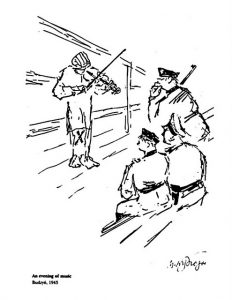Stanley seldom talked to us about his survival in the concentration camps, but that was where the tattoo came from. He explained that his life was spared because he was a musician. Stanley played the violin. “We would play for the SS officers- sometimes when they had sex”-he told us once. Stanley had the kind of mouth where you didn’t see his teeth as he spoke but when he said sex, telling us this story, his eyes were narrow and his lips and teeth formed a straight line across his face. Stanley’s stories were never long, never truly painted a picture of the horror he had survived. This was the way that things were done in those days by men of his age. I was happy to know him as the man who introduced me to the Russian Tea Room, with an office on 57th Street. Were it not for that tattoo I wonder whether we would have known his history at all.
We were so very young. There’d be some whining about wanting to play rock gigs and be on the new hottest thing, MTV! Stanley would find us work in the Catskills and Atlantic City where we made decent money and were booked for months on end. ‘Girls, girls”, he would say with a gentle sort of exasperation as he tried to manage expectations.
As far as Stanley was concerned, he had us working- period! We worked fifty weeks the first year that the band was together. After a typical lunch he’d tell stories where the moral came always with his trademark expression– “that’s not a gig?”
I think he genuinely liked us. Most meetings were probably a chance to feel happy at lunch with five attractive women who were trying to look like budding rock stars. He seemed like a classic manager to me, talking about Joan Rivers and bookings in the Poconos. He would remind us that he was a manager, not a booking agent. He worked with agents! In New York State there is a difference by law, which only people who worked for agencies like William Morris would even know. My agent mentioned this law last year. I said “yes, I know” remembering that Stanley taught me this and so many other things by example. He was a gentleman and a pragmatist, a survivor.
Whenever I see someone with a gig that walks that thin line between survival and art, I say to myself – “that’s not a gig?”. I can hear his accent, the way his voice rose like a shrug of the shoulders. Again, it was just one of those things that you never forget.
 While I was in St. Barth’ this season, I invited the keyboard player Adam, to come check out a guitarist from Spain who calls himself Soley. I met Soley six years ago on St. Barth’. This year, I found him playing in the sand at Shell Beach in front of the juice bar with his nylon string guitar. Soley is striking and beautiful, the way I imagine the devil must be, if you believe in such things. He has flowing blond dred locks and eyes the color of the sky at dawn. He erupts with bursts of classic flamenco strumming, singing so very hard with a sandpaper voice. He came over immediately and began to play right in front of me. I’m sure he knows I love him- and that’s ok. I am fascinated – I think he is brilliant. I can’t believe he’s here playing unplugged in the sand. I also can’t believe that I payed 20 euro for two non- alcoholic fruit smoothies and tried to look cool about that. As we left I said to Adam – “that’s not a gig?”
While I was in St. Barth’ this season, I invited the keyboard player Adam, to come check out a guitarist from Spain who calls himself Soley. I met Soley six years ago on St. Barth’. This year, I found him playing in the sand at Shell Beach in front of the juice bar with his nylon string guitar. Soley is striking and beautiful, the way I imagine the devil must be, if you believe in such things. He has flowing blond dred locks and eyes the color of the sky at dawn. He erupts with bursts of classic flamenco strumming, singing so very hard with a sandpaper voice. He came over immediately and began to play right in front of me. I’m sure he knows I love him- and that’s ok. I am fascinated – I think he is brilliant. I can’t believe he’s here playing unplugged in the sand. I also can’t believe that I payed 20 euro for two non- alcoholic fruit smoothies and tried to look cool about that. As we left I said to Adam – “that’s not a gig?”
Epilogue: That night after my gig, when everyone went to sleep, I stayed on the terrace with my laptop and using Google and the name Stanley Flato, found the book A Brush with Death an artist in the death camps-Morris Wysgorod. The few stories I read were unimaginable. I gasped when I saw an illustration of Stanley-it is on page 140 (see above). My mood grew dark so I said to myself, be grateful you’re in St. Barth’, maybe you’ll see a shooting star. I turned my head up and a shooting star flew straight across the sky as though it traced the line of my nose. That is when I decided to write the story remembering Stanley Flato- a man I will never forget.


 Although she continues to define herself as an “urban folk and jazz” artist, KJ's journey has led her to explore the many genres that influenced her life and music. Her Journey continues to push the boundaries of her own definition. This archive is a chronicle of KJ's journey—her thoughts, her words, her memories and many inspirations.
Although she continues to define herself as an “urban folk and jazz” artist, KJ's journey has led her to explore the many genres that influenced her life and music. Her Journey continues to push the boundaries of her own definition. This archive is a chronicle of KJ's journey—her thoughts, her words, her memories and many inspirations.